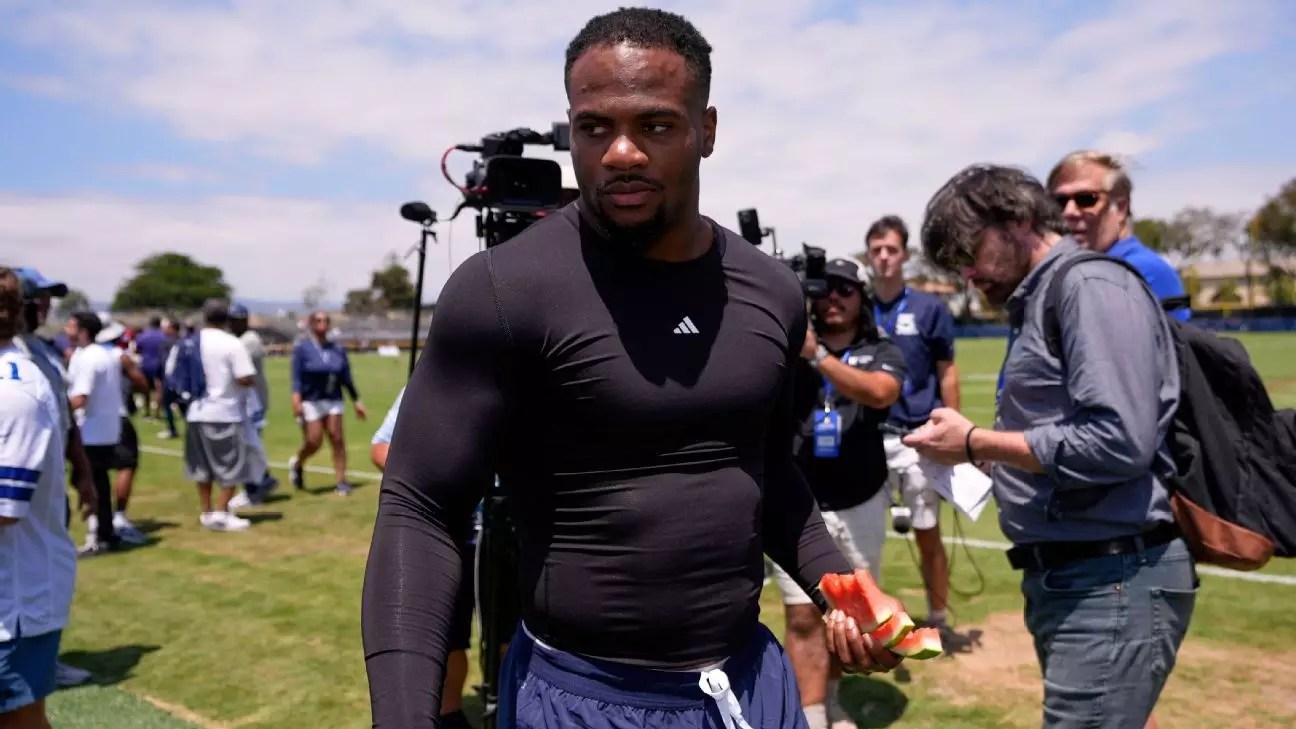The Dallas Cowboys’ handling of Micah Parsons’s contract situation reveals a concerning disconnect between optimistic public statements and the underlying reality. While coach Brian Schottenheimer confidently assures fans and media that Parsons will be ready for the season opener, the ambiguity surrounding the negotiations exposes a fragile foundation that threatens team stability. This overconfidence masks an unsettling truth: overlooking or downplaying contract disputes can severely undermine team cohesion and player performance, especially when key figures like Parsons are sidelined by injury or contractual uncertainties.
In the high-stakes landscape of NFL football, declarations of readiness and assurances about availability often serve as surface-level assurances rather than concrete commitments. The fact that Parsons remains unsigned beyond his fifth-year option raises questions about the long-term strategic planning of the franchise. The apparent gap in communication—no recent talks despite the owner’s earlier confidence—suggests a deeper issue that could reverberate throughout the season. Fans and analysts should remain skeptical of hollow optimism; ignoring the cracks in negotiations only increases the risk of unforeseen disruptions.
The Cost of Complacency in Player Management
The Cowboys’ approach to Parsons’s injury and contract standoff exemplifies a dangerous complacency that many teams fall prey to. By relying on a combination of walkthroughs, meetings, and the player’s own self-awareness, Dallas seems to believe that Parsons can-or will-be sufficiently prepared without rigorous on-field practice. This mindset is inherently flawed. The NFL is a brutal, physically demanding league where intangible factors like instinct, timing, and muscle memory play critical roles. Relying solely on Parsons’s reported understanding of plays and his body’s condition is a gamble at best.
This complacency can have costly repercussions. Without full-on-field drills, Parsons’s ability to change direction and execute his pass-rushing moves could be compromised, increasing the likelihood of injury during critical moments. The emphasis on his “being prepared” based on recovery and walkthroughs neglects the vital importance of live practice. Over time, this neglect can lead to diminished performance, long-term health issues, and the team’s inability to fully utilize his talents.
Moreover, the decision to hold back from on-field activity reflects a wider misjudgment about player development and injury prevention. In a league where every snap counts, not prioritizing full participation can diminish the very edge the Cowboys rely on. The team’s silence and optimism create a false sense of security that could ultimately backfire if Parsons is not match-ready when it truly matters.
The Broader Implications of Contract Neglect
There is a more insidious danger in the Cowboys’ current stance: the risk of fostering a culture of neglect around player negotiations and welfare. When franchises delay or sideline contract talks, it breeds a climate of uncertainty that affects not only the individual player but also the locker room dynamic. Parsons, a franchise cornerstone and a symbol of Dallas’s defensive ambitions, appears to be caught in a limbo that could foster resentment or distraction.
Furthermore, the decision to potentially keep an extra pass rusher to mitigate Parsons’s absence is a shortsighted fix that might create roster imbalance. It exemplifies the broader failure to proactively address player issues before they escalate. Teams that neglect the importance of timely negotiations and injury management often find themselves hemorrhaging talent and morale during critical phases of the season.
In the ferocious environment of the NFL, where weeks of preparation can determine playoff success, ignoring the foundational issues of player contracts and health is a textbook example of shortsightedness. It undermines the mutual trust necessary for a supportive team culture, where players feel valued beyond just their on-field contributions, and management remains committed to safeguarding their investment.
The Dallas Cowboys’ current handling of Micah Parsons highlights a profound lesson about the high cost of complacency. Relying on vague assurances rather than concrete negotiations and dismissing the importance of full practice underscores a perilous underestimation of the complexities within team management. For a franchise with aspirations of greatness, such short-sighted strategies threaten to derail long-term success. Instead of resting on superficial confidence, Dallas must confront these issues head-on—addressing contract disputes transparently and prioritizing comprehensive player readiness—to truly harness the transformative power of their most talented assets. Failing to do so risks turning a promising season into a cautionary tale of neglect and missed opportunities.

